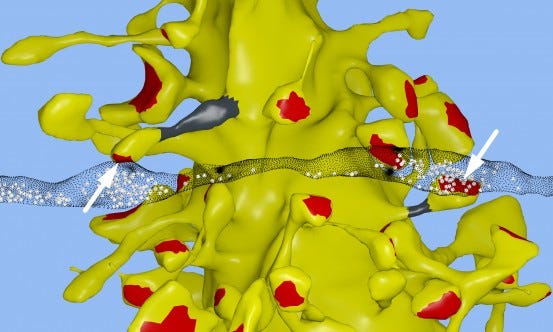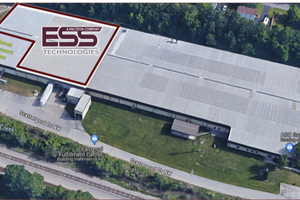Why the Future of Computing Could Be in Our Heads
January 28, 2016
A neuroscientist explains why brain discoveries may pave the way for the future of computing.
Qmed Staff
|
A computational reconstruction of brain tissue in the hippocampus revealed a complex structure that had been previously unknown. Credit: Salk Institute. |
Salk Institute recently announced a neuroscience bombshell, proclaiming that the brain had ten times the memory capacity than previously assumed. The discovery could help spur the development of super-energy-efficient neuro-inspired computers.
To learn more about the research breakthrough, we reached out to Cailey Bromer, a fourth-year graduate student in the UCSD Neuroscience PhD program who was involved in the research project.
Qmed: Can you explain how this new understanding of the brain's memory capacity could help us make computers more efficient?
|
Cailey Bromer |
Bromer: One of the questions our lab (like so many others in neuroscience) tries to answer is: how does the brain compute? Often we are looking at only a tiny piece of the brain,which has many structures and layers and cell types, so our answers are constrained by the specifics of our data. The area of the brain that we looked at in the study is the hippocampus, which is important for constructing memories, as well as spatial navigation. If we think about bits in a computer as the lowest common denominator for communication there, we think of the information exchanged as binary (0 or 1).
Our finding suggests that the lowest common denominator for communication in the brain, the synapse, or the connection point between neurons, exchanges more information than that of a computer. This finding certainly suggests that more energy efficient ways of computing are possible than those that are currently standard. Many people are working on building models that mimic the brain's computations, and we think our finding supports the validity of their pursuits.
Qmed: Do you think that this kind of enhanced understanding of the size and shapes of synapses could help one day lead ultra-precise, energy efficient computers that can employ "deep learning" techniques such as speech and object recognition?
Bromer:In order to accurately model the brain (or a piece of the brain, such as hippocampus), and employ such a model in techniques like "deep learning", we need to understand more than just the limits for energy exchange at the synapse. Our data represents a static image of a brain, frozen in a single moment in time. While we were able to use the connectivity of neurons in the sample and our understanding of the hippocampus from previous experiments in the field, additional modeling and experimentation is required to fully understand how a single neuron integrates the information it receives at each of its many synapses.
A neuron's firing (its output signal) is an all or none event, but even between firing events (called action potentials), the size of synapses is changing. Understanding what the changes at the synapse mean functionally will enable us to better imitate and capitalize on nature's energy efficient computation (the brain). This is work we hope to continue to pursue.
Qmed: What kind of an impact do you think such advanced computer systems could have, and how significant do you think your research could be in creating that kind of technology?
Bromer: Science is a collaborative effort, and we've published in an open access journal and made our data available in the hopes that our research can be used by others interested in similar questions. Our work is important, but its only a tiny piece of the puzzle. There are a lot of potential wonderful uses for advanced, energy-efficient computational models of the brain. One of the biggest concerns I have about the rate at which computing is improving is whether we are educating students, at all stages of education, to be competitive and self-sufficient in a world where more and more jobs are being automated.
Trying to understand the brain is a fascinating and rewarding pursuit in and of itself, but the impact improved computing based on this understanding could have is enormous and exciting, and will raise lots of ethical and political questions. It is my hope that we will be able to harness this kind of efficiency for the greater good.
Learn more about cutting-edge medical devices at MD&M West, February 9-11 at the Anaheim Convention Center in Anaheim, CA. |
Like what you're reading? Subscribe to our daily e-newsletter.
About the Author(s)
You May Also Like




